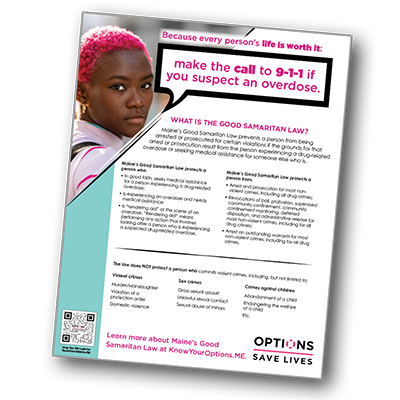Maine’s Good Samaritan Law
On May 3, 2022, Governor Janet Mills signed LD 1862, An Act To Strengthen Maine’s Good Samaritan Laws Concerning Drug-related Medical Assistance (known as the Good Samaritan Bill), into law.
What is the Good Samaritan Law?
Maine’s Good Samaritan Law prevents a person from being arrested or prosecuted for certain violations if the grounds for that arrest or prosecution result from the person experiencing a drug-related overdose or seeking medical assistance for someone else who is.
If you or someone you are with is experiencing a drug overdose, administer naloxone and CALL 9-1-1. (Don’t have naloxone? Learn where to find it so you can always have it on hand.)
Download the flyer that explains the Maine Good Samaritan Law.
Maine’s Good Samaritan Law protects a person who:
- In good faith, seeks medical assistance for a person experiencing a drug-related overdose;
- Is experiencing an overdose and needs medical assistance;
- Is “rendering aid” at the scene of an overdose. “Rendering aid” means performing any action that involves looking after a person who is experiencing a suspected drug-related overdose.
Maine’s Good Samaritan Law protects a person from:
- Arrest and prosecution for most non-violent crimes, including all drug crimes;
- Revocations of bail, probation, supervised community confinement, community confinement monitoring, deferred disposition, and administrative release for most non-violent crimes, including for all drug crimes;
- Arrest on outstanding warrants for most non-violent crimes, including for all drug crimes.
The law does NOT protect a person who:
Commits violent crimes, including, but not limited to:
Violent crimes
- Murder/Manslaughter
- Violation of a protective order
- Domestic violence
Sex crimes
- Gross sexual assault
- Unlawful sexual contact
- Sexual abuse of minors
Crimes against children
- Abandonment of a child
- Endangering the welfare of a child
- Etc.
Why are laws like this important?
Because they have been proven to save lives.
Maine is one of 47 other states and the District of Columbia that have enacted some form of a Good Samaritan or 911 drug immunity law. A 2020 study by the Government Accountability Office (GAO) found a nationwide pattern of lower opioid-related overdose death rates among states that have enacted Good Samaritan laws, both compared to death rates prior to a law’s enactment and death rates in states without such laws. Studies also found that people are more likely to call 911 if they are aware of the laws.
You can download an overview of the study here or read the full study here.
